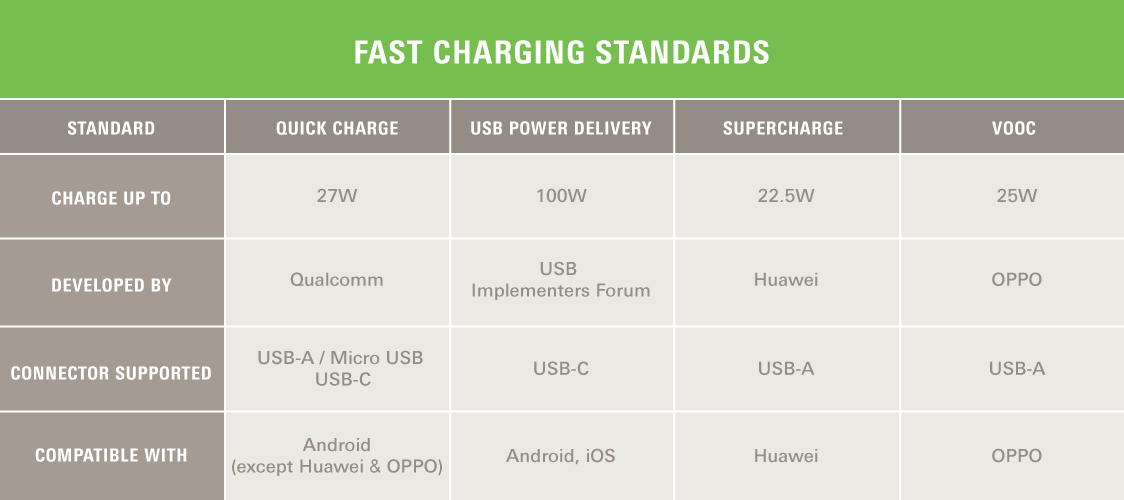Charging-Technologies.jpg) When selecting a power bank, it’s important to know its capability because not all power banks are created equal. Silicon Power’s line of fast-charge-enabled power banks take advantage of up to 4 different rapid charging technologies that are widely used across the industry. These technologies are USB Power Delivery (USB-PD), Quick Charge (QC), SuperCharge, and VOOC.
When selecting a power bank, it’s important to know its capability because not all power banks are created equal. Silicon Power’s line of fast-charge-enabled power banks take advantage of up to 4 different rapid charging technologies that are widely used across the industry. These technologies are USB Power Delivery (USB-PD), Quick Charge (QC), SuperCharge, and VOOC.
USB Power Delivery (USB-PD)
USB Power Delivery (USB-PD) was introduced by the USB Implementers Forum, the creators of the USB standard. It is an industry-standard open specification that provides high-speed charging with variable voltage up to 20V using intelligent device negotiation up to 5A at 100W. However, most mobile devices will maximize output at 30W because that is on the upper range of what most smartphones and tablets can handle. USB-PD provides one universal way to quickly power a wide variety of different mobiles devices and boasts speedy charge rates up to 2.5 times faster than conventional charging rates.
An additional useful feature regarding USB-PD is that it allows for power to flow both ways, with no set direction based on circuit or connection. Therefore, it is possible to re-charge our power banks using the USB-PD enabled Type-C port at rapid speeds. Our 10,000mAh USB-PD models will be fully charged within 3.5 hours, compared to a much longer 6 hours for power bank models without USB-PD.
Quick Charge (QC)
Quick Charge is a proprietary charging standard developed by the chipmaker, Qualcomm®. QC achieves fast charging by upping the charging voltage, which in turn boosts the wattage. For QC 3.0, the most widely used version of QC, the voltage range is 3.6V minimum and 20V maximum, which QC 3.0 increments or decrements using Intelligent Negotiation for Optimum Voltage (INOV) to identify the most efficient voltage at any giving point during charging. At its peak voltage, QC 3.0 can deliver 18W of power. Qualcomm® claims that smartphones can charge up to 50% in 30 minutes with their technology.
SuperCharge
SuperCharge is a proprietary charging standard developed by Huawei®. Huawei® claims that unlike other charging technologies such as USB Power Delivery and Quick Charge that achieve fast charging by providing high voltage and standard currents, the more efficient charging method is to keep voltage closer to the battery cell's voltage. Therefore, SuperCharge automatically adapts the incoming voltage and current based on the condition of the phone’s battery and internal temperature. SuperCharge operates at a peak of 4.5V/5A (22.5W) and requires the use of their proprietary charging cable. With this protocol, Huawei® smartphones can charge up to 90% in 60 minutes.
VOOC
VOOC (Voltage Open Loop Multi-Step Constant-Current Charging) is a proprietary rapid-charge technology developed by OPPO Electronics®. In contrast to the USB Power Delivery and Quick Charge technologies, which increase the voltage during fast charging, VOOC uses a higher current than normal USB 2.0 charging. VOOC operates at a peak of 5V/5A (25W). By bumping up the charger’s amperage instead of the voltage, it’s able to achieve a more even distribution of electrical current at higher levels. According to OPPO Electronics®, VOOC-enabled smartphones can charge up to 75% in 30 minutes. In order to utilize this technology, their proprietary charging cable is required.
Are you ready to select the fast-charge-enabled power bank that’s right for you? Visit our product page.

 Australia
Australia Bangladesh
Bangladesh Cambodia
Cambodia China
China HongKong
HongKong India
India Indonesia
Indonesia Japan
Japan Korea
Korea Malaysia
Malaysia Mongolia
Mongolia Myanmar
Myanmar Nepal
Nepal New Zealand
New Zealand Pakistan
Pakistan Philippines
Philippines Singapore
Singapore SriLanka
SriLanka Taiwan
Taiwan Thailand
Thailand Vietnam
Vietnam Austria
Austria Belarus
Belarus Belgium
Belgium Bosnia
Bosnia Bulgaria
Bulgaria Croatia
Croatia Cyprus
Cyprus Czech Republic
Czech Republic Denmark
Denmark Estonia
Estonia Finland
Finland France
France Germany
Germany Greece
Greece Hungary
Hungary Iceland
Iceland Ireland
Ireland Italy
Italy Kazakhstan
Kazakhstan Kosovo
Kosovo Latvia
Latvia Lithuania
Lithuania Macedonia
Macedonia Malta
Malta Netherlands
Netherlands Norway
Norway Poland
Poland Portugal
Portugal Romania
Romania Serbia
Serbia Slovakia
Slovakia Slovenia
Slovenia Spain
Spain Sweden
Sweden Switzerland
Switzerland Turkey
Turkey Ukraine
Ukraine United Kingdom
United Kingdom